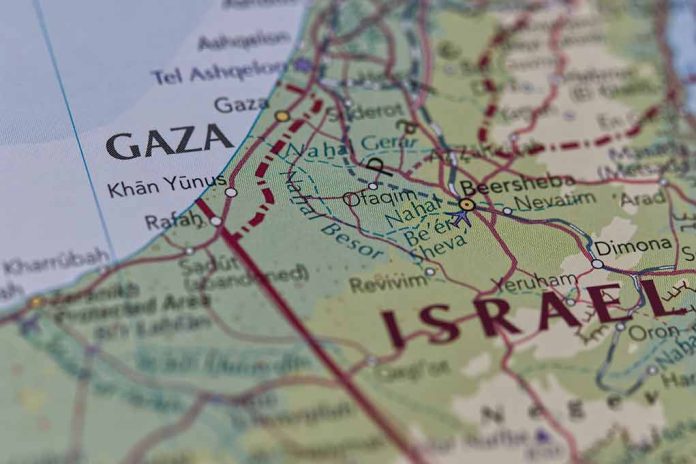
Turkey’s recent decision to cut diplomatic and trade ties with Israel marks a crucial moment with far-reaching consequences in regional geopolitics.
At a Glance
- Turkey severed relations with Israel amid rising tensions in Gaza.
- Erdogan condemns Israel’s actions as genocide, calling for aid and a ceasefire.
- Turkey positions itself as a key ally for Palestinian aid and advocacy.
- Turkey halts trade with Israel, aligning itself with broader international sanctions.
Diplomatic Break Unfolds
President Recep Tayyip Erdogan announced Turkey’s formal severance of relations with Israel, condemning its actions in Gaza and Lebanon. Erdogan’s vocal criticism came as Turkey continues its unwavering support for Palestinian rights, alongside a call for a ceasefire. With the Turkish embassy in Tel Aviv operating normally, Israel has yet to respond officially to these statements.
Turkey is taking a strategic stance, offering logistical support and political advocacy for Palestinians and refugees. This decision is in line with Erdogan’s broader foreign policy, emphasizing Turkey’s role as a proponent of Palestinian rights. The diplomatic tension between Turkey and Israel is expected to influence Turkey’s interactions on the international front.
Turkey has severed all ties with Israel, Turkish President Recep Tayyip Erdogan announced. He also emphasised that Turkey would do everything in its power to hold Israeli PM Benjamin Netanyahu accountable for his actions in Gaza, which international human rights groups have…
— Middle East Eye (@MiddleEastEye) November 14, 2024
Impact on Trade and International Relations
Erdogan declared a halt to Turkish-Israeli trade until a permanent ceasefire is achieved in Gaza. This step aligns Turkey with wider international sanctions aimed at addressing the conflict. Trade Minister Omer Bolat highlighted Israel’s “uncompromising attitude,” while Erdogan acknowledged potential repercussions from Western countries due to Turkey’s assertive role.
Despite the ongoing diplomatic tensions, Turkey’s trade surplus with Israel had reached a significant $5.4 billion in exports last year, making the economic impact of these decisions substantial. As Turkey positions itself on humanitarian grounds, these policy changes may recalibrate its political alliances, especially amid Erdogan’s recent diplomatic engagements with Saudi Arabia and Azerbaijan.
Repercussions and Future Outlook
Israel’s Foreign Minister, Israel Katz, criticized Erdogan for acting like a dictator and ignoring established international trade agreements. The Israeli response reveals deep-seated tensions that could impact existing diplomatic relations and necessitate recalibrated policies in the region. Turkey’s bold decisions could reshape regional alliances, advocating for Palestinians’ rights on an international platform.
With Erdogan’s assertive policies, Turkey might challenge its Western relationships while bolstering its ties in the Middle East. It remains to be seen how these diplomatic shifts will play out in the long term, as countries continue to navigate the complexities of regional and international politics centered around the Israeli-Palestinian conflict.
Sources:
Erdogan Says Turkey Breaking Ties With Israel
Turkey Cuts Off Relations With Israel: Reports
As Turkey Cuts Trade Ties, Israel’s Isolation Grows













